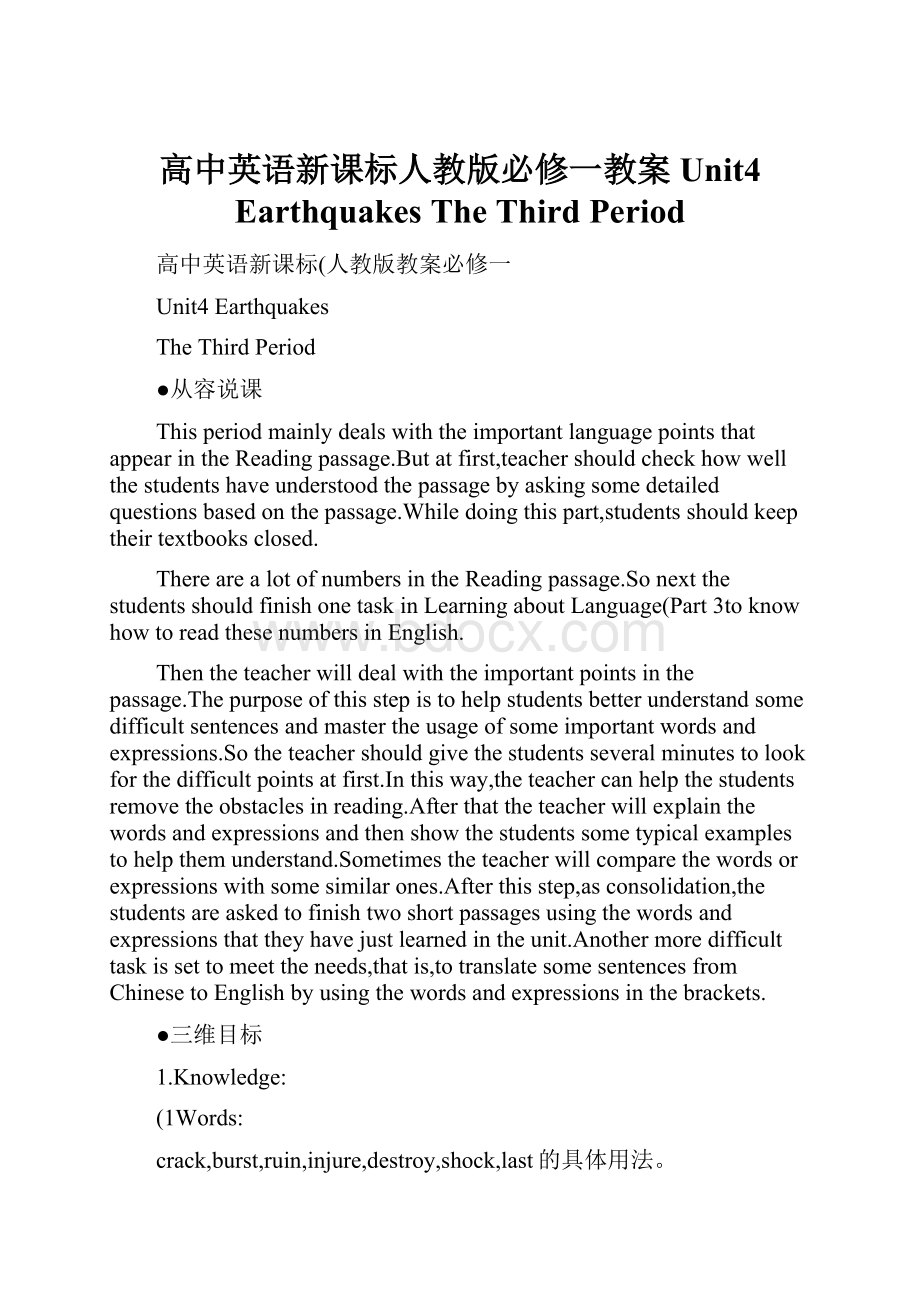高中英语新课标人教版必修一教案 Unit4 Earthquakes The Third Period.docx
《高中英语新课标人教版必修一教案 Unit4 Earthquakes The Third Period.docx》由会员分享,可在线阅读,更多相关《高中英语新课标人教版必修一教案 Unit4 Earthquakes The Third Period.docx(11页珍藏版)》请在冰豆网上搜索。

高中英语新课标人教版必修一教案Unit4EarthquakesTheThirdPeriod
高中英语新课标(人教版教案必修一
Unit4Earthquakes
TheThirdPeriod
●从容说课
ThisperiodmainlydealswiththeimportantlanguagepointsthatappearintheReadingpassage.Butatfirst,teachershouldcheckhowwellthestudentshaveunderstoodthepassagebyaskingsomedetailedquestionsbasedonthepassage.Whiledoingthispart,studentsshouldkeeptheirtextbooksclosed.
TherearealotofnumbersintheReadingpassage.SonextthestudentsshouldfinishonetaskinLearningaboutLanguage(Part3toknowhowtoreadthesenumbersinEnglish.
Thentheteacherwilldealwiththeimportantpointsinthepassage.Thepurposeofthisstepistohelpstudentsbetterunderstandsomedifficultsentencesandmastertheusageofsomeimportantwordsandexpressions.Sotheteachershouldgivethestudentsseveralminutestolookforthedifficultpointsatfirst.Inthisway,theteachercanhelpthestudentsremovetheobstaclesinreading.Afterthattheteacherwillexplainthewordsandexpressionsandthenshowthestudentssometypicalexamplestohelpthemunderstand.Sometimestheteacherwillcomparethewordsorexpressionswithsomesimilarones.Afterthisstep,asconsolidation,thestudentsareaskedtofinishtwoshortpassagesusingthewordsandexpressionsthattheyhavejustlearnedintheunit.Anothermoredifficulttaskissettomeettheneeds,thatis,totranslatesomesentencesfromChinesetoEnglishbyusingthewordsandexpressionsinthebrackets.
●三维目标
1.Knowledge:
(1Words:
crack,burst,ruin,injure,destroy,shock,last的具体用法。
(2Phrases:
atanend,rightaway,digout的用法
(3Sentencepatterns:
Allhopewasnotlost.(部分否定句
2.Ability:
(1Trainthestudents’abilitytoreaddifferentnumbersinEnglish.
(2Learntheusageofsomedifficultwordsandexpressions.
(3Trainthestudents’abilitytoremovethedifficultieswhilereading.
3.Emotion:
(1Trainthestudents’abilitytocooperatewithothers.
(2Knowthedeadlinessofanearthquakeandthesignsbeforeanearthquakeiscoming.
(3LearnfromthebraveryofpeopleinTangshantofacetherealityandrebuildthecity.
●教学重点
(1Trainthestudents’abilitytoreaddifferentnumbersinEnglish.
(2Trainthestudents’abilitytocooperatewithothers.
●教学难点
(1Theexplanationofsomedifficultwordsandexpressions.
(2Trainthestudents’abilitytoremovethedifficultieswhilereading.
●教具准备
(1ataperecorder
(2aprojector
(3theblackboard
●教学过程
Step1Greetings
Greetthewholeclassasusual.
Step2Revision
T:
Inthelastperiod,welearnedsomethingabouttheterribleTangshanEarthquakein1976,whichisthedeadliestearthquakeinChina’shistory.NowIamgoingtoaskyousomequestionsbasedontheReadingpassage.
T:
WhatdidpeopleinTangshanseeintheskybeforetheearthquake?
S1:
Theysawbrightlightsinthesky.
T:
Whatdidpeoplehear?
S2:
TheyheardthesoundofplanesoutsideTangshanevenwhennoplaneswereinthesky.
T:
Whatdidpeoplenoticeinthewells?
S3:
Peoplenoticedthewellwallshaddeepcracks,andasmellygascameoutofthecracks.
T:
Didpeoplepayanyattentiontotheseabnormalphenomena?
S4:
No.Theywenttobedasusualthatnight.
T:
Whendidtheearthquakebegin?
S5:
At3:
42inthemorningofJuly28.
T:
Howmanypeoplewerekilledorinjuredinthequake?
S6:
Morethan400000people.
T:
Couldtheinjuredpeoplegotohospital?
S7:
No,theycouldn’tbecauseallofthecity’shospitalsweregoneinthequake.
T:
Werethereanyaftershocks?
S8:
Yes.Laterthatafternoon,anotherbigquakeshookTangshan.Manyrescueworkersanddoctorsweretrappedundertheruins.
T:
Didthesurvivorsdenythecityandgotoliveinotherplaces?
S9:
No.Theydidtherescueworkwiththehelpof150000soldierssentbythearmy.SlowlythecityofTangshanbegantobreatheagain.
T:
Iamverysatisfiedwithyourwork.
Step3LearningaboutNumbers
T:
MaybeyouhavealreadynoticedthattherearealotofnumbersintheReadingpassage.Toreadthemcorrectlyisveryimportant.SometimesthereisatestonnumbersinListening.
T:
NowturntoPage28andlookatPart3.Matcheachwordtothenumberthathasthesamemeaning.
(AllowSsseveralminutestofinishthetask.
T:
Nowlet’scheckyouranswers.
S:
A.90%ninetypercent
B.10000tenthousand
C.1000000onemillion
D.150000onehundredandfiftythousand
E.75%seventy-fivepercent
F.1/3one-third
G.500000halfamillion
H.2/3two-thirds
Step4Importantpoints
T:
IntheReadingpassageofthisunit,therearesomeimportantwordsandexpressions.Iwillfirstgiveyoufiveminutestopickoutthedifficultwords,expressionsandsentencepatterns.Youmayworkwithyourpartner.
(Afterfiveminutes.
S1:
Inthefirstparagraph,“...thewaterpipesinsomebuildingscrackedandburst.”Howcanweunderstand“burst”?
T:
Ifsomethingburstsorifyouburstsit,itbreaksopenorapartsuddenlyandviolentlysothatitscontentscomeout.
e.g.Youaregoingtobursttheballoon,ifyouarenotcareful.
S2:
Inthefirstparagraph,“Farmers’wivesnoticedthatthewellwallshaddeepcracksinthem.”andinthesecondparagraph“Ahugecrackthatwaseightkilometerslongandthirtymeterswide.”Dothetwo“cracks”havethesamemeaning?
T:
Youareverycareful.Yes,theyhavethesamemeaning.Bothofthemarenouns.“Crack”meansaverynarrowspacebetweentwothingsortwopartsofsomething.“Crack”canalsobeaverb,meaningtobreakormakesomethingbreaksothatitgetsoneormorelinesonitssurface,asinthesentence“Inthecity,thewaterpipesinsomebuildingscrackedandburst.”
e.g.Shefelloffherbikeandcrackedaboneinherleg.
S3:
Howcanweunderstandthissentenceinthesecondparagraph“Itseemedthattheworldwasatanend.”?
T:
Inordertounderstandthissentence,youhavetoknowthemeaningofthephrase“beatanend”.Itreferstoasituationinwhichsomethingisfinishedornolongerexisted.
e.g.Thelonghotsummerwasatlastatanend.
Otherexamplesare“cometoanend”,“putanendtosth.”.
T:
Sonowwhocanexplainthesentenceinourtext?
S4:
Letmehaveatry.Theearthquakewassoterriblethatnearlyeverythingwasdestroyed.Sopeoplethoughtitwastheendoftheworld.
T:
Excellent.Andthissentenceusesexaggeration.
S5:
Inthesecondparagraph,“Infifteenterriblesecondsalargecitylayinruins.”Whydon’tweuse“ruin”insteadof“ruins”?
T:
“Ruin”canbeanuncountablenoun,whichmeansasituationinwhichyouhavelostallyourmoney,yoursocialposition,orthegoodopinionthatpeoplehadaboutyou.
e.g.Withthecollapseofgrainprices,smallfarmersareonthebrinkoffinancialruin.
While“ruins”meansthepartofabuildingthatisleftaftertheresthasbeendestroyed.
e.g.theruinsofabombed-outofficeblock
S6:
Inthesecondparagraph“Two-thirdsofthepeoplediedorwereinjuredduringtheearthquake.”Canweuse“wound”totaketheplaceof“injure”?
T:
No.Toinjuresomeonemeanscausingphysicalharmtosomeone,forexampleinanaccidentoranattack.Towoundsomeonemeansinjuringsomeone,especiallybymakingacutor
holeintheirskinusingaknife,gun,etc.
e.g.(1Oneoftheplayersinjuredhiskneeandhadtobecarriedof
f.
(2Gunmenkilledtwopeopleandwoundedsixothersinanattacktoday.
S7:
Inthethirdparagraph“Everywheretheylookednearlyeverythingwasdestroyed.”Canweusetheword“ruin”totaketheplaceof“destroy”?
T:
No.“Destroy”meanstodamagesomethingsobadlythatitnolongerexistsorcannotberepaired.Ifyou“ruin”somethinggoodoruseful,itthenusuallyexists,butnolongerhasitsgoodqualitiesorfeatures.
e.g.(1Theschoolwascompletelydestroyedinthebigfirelastnight.
(2Toomuchsugarcanruinyourteeth.
S8:
Inthethirdparagraph,“Peoplewereshocked.”What’sthemeaningofthesentence?
T:
“Shock”heremeanstomakesomeonefeelverysurprisedandupsetandunabletobelievewhathashappened.
e.g.Themurderofsuchayoungchilddeeplyshockedthewholecommunity.
S9:
Sothesentenceinourtextmeanspeopleweresurprised.
T:
Yes.Butthereisaslightdifferencebetween“shock”and“surprise”.Ifsomethingis,comesas,orgivesyouashockitisunexpectedandoftenverybad.
e.g.Itcameasagreatshocktohearshewasleavinghome.
Butasurpriseissomethingthatisunexpected,butisnotnecessarilybad.
e.g.Whatanicesurprise!
Ididn’teventhinkyouwereinthecountry!
S10:
Inthethirdparagraph,“Peoplebegantowonderhowlongthedisasterwouldlast.”Whatdoestheword“last”meaninthissentence?
Isitanadjective?
T:
No,itisnotanadjectivebutaverb.“Last”heremeanstocontinueforaparticularlengthoftime.
e.g.ThehotweatherlastedforthewholemonthofJuly.
Asaverb,“last”couldalsomeantomanagetoremaininthesamesituation,evenwhenthisisdifficult.
e.g.Theywon’tbeabletolastmuchlongerwithoutfreshsupplies.
Theword“last”canalsobeusedasalinkingverb.Itmeansbeingenoughforsomeonetouse.
e.g.Weonlyhad$50tolastustherestofthemonth.
S11:
Inthelastparagraph,“Allhopewasnotlost.”Whatisthemeaningofthissentence?
T:
Thissentenceisapartialnegative.Ithasthesamemeaningwith“Notallhopewaslost.”
e.g.(1Allthestudentsdonotagreetotheplan.
(2Notallthestudentsagreetotheplan.
Thesetwosentencesmeansomeofthestudentsagreetotheplan,butsomedon’t.
Step5Consolidation
T:
Nowaftertheexplanationsofthewords,expressionsandsentencepatterns,let’sdosomeexercises.PleaseturntoPage28andlookatPart2inLearningaboutLanguage.Completethepassagewithsomeofthewordsinthetext.
(Afterseveralminutesteacherasksoneofthestudentstoreadtheshortpassage.Correctanymistakesifthereareany.
Step6Homework
T:
Inordertomastertheusageofthesewordsandexpressions,pleasedosomerelatedexercises.FinishoffthetwopartsinUsingW